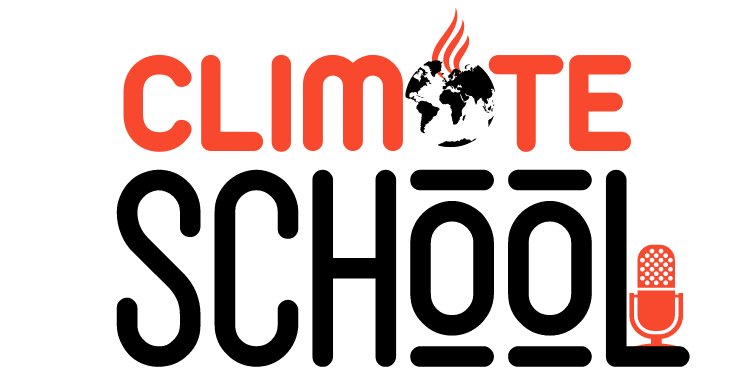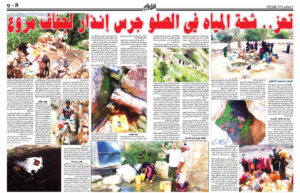This article is quoted from the International Journalists Network website - link to the original article published on July 11, 2023 here
Years ago, when I started specializing in environmental journalism in Egypt, I was faced with some challenges, such as the small number of journalists working specializing in this type of issues, and the limited number of journalistic platforms interested in publishing environmental stories. Consequently, there was a lack of local training opportunities and job opportunities.
These reasons led me to search for support in international fellowships and grants designated for environmental journalists, which helped me a lot in deepening my understanding of issues related to the environment and climate change, and opened horizons for me to learn, draw inspiration from new angles for journalistic stories, and meet dozens of environmental journalists from different countries of the world and exchange experiences and get to know each other. On rich cultures, some fellowships also allowed me to visit distant regions rich in environmental story ideas in several countries.
Therefore, if you are a journalist interested in environmental issues, you should look for these fellowships that provide you with “knowledge,” and through them you meet environmental journalists of different nationalities to share experiences and challenges, and attend training and discussions that open your eyes to new issues that you have never heard of before, and you may get Opportunities to create cross-border journalistic stories in cooperation with journalists from other countries.
Also, thanks to the fellowships, you will benefit from “networking” with many officials, specialists, and researchers that you meet in each country, which represents a golden opportunity to produce distinctive stories while you are in the fellowship, or by communicating with them later to seek their help in other future stories, in addition to Expand your source base of international journalists.
Also, some fellowships provide “field tours,” which are a good opportunity to visit environmental sites and produce stories about them. For example, when I received a fellowship at the Berlin Energy Dialogue Forum in Germany, I visited several sites for producing renewable energy, and sites for producing cars that run on electricity and hydrogen, and I met many people. Specialists who explain the details and answer all questions. During the Fellowship of the Society of Environmental Journalists in the United States of America, I visited several sites for producing food and raising cows and fish in an environmentally friendly way.
Fellowships also help you get to know international news organizations and “find new job opportunities,” because during them you may meet journalists or officials from press platforms who are looking for a journalist to cover local news in your country.
Where can you find these fellowships?
There are many platforms that I browse from time to time to learn about new opportunities available to environmental journalists, whether journalistic fellowships or story production grants, the most prominent of which are:
-International Journalists' Network: The Opportunities section of the International Journalists' Network includes dozens of fellowships and grants for journalists, from which you can choose what is directed to environmental journalists.
-The Bulletzer Center, an institution concerned with supporting journalists from all over the world, and although the opportunities and production grants it offers are not limited only to environmental journalists, it also offers many environmental journalism grants that focus on climate change and biodiversity, the latest of which is now available for production. Reports focusing on ocean biodiversity.
-Info Nile, an organization interested in journalism that focuses on water issues, provides many grants and fellowships to science and environmental journalists to attend training, or joint fellowships with scientists and researchers specializing in water, or provides grants to produce journalistic stories in which water issues intersect with climate change and diversity. Biological.
Mongabay, a conservation organization, supports journalists to report on environmental issues by providing fellowships, training opportunities and grants to produce stories.
-The Society of American Environmental Journalists, an association whose members are mostly American journalists, but it also allows membership for environmental journalists from any country in the world in exchange for an annual subscription, and provides a journalistic fellowship every year to attend the society’s conference in the United States of America. The fellowship also includes a number of field environmental tours. You will bear all travel and accommodation costs.
The Center for Environmental Journalism at the University of Colorado Boulder in the United States is concerned with the professional development of environmental journalists and offers a paid fellowship for environmental journalism for one year.
Climate Tracker, an organization that supports journalists to write about climate change issues, provides fellowships for training, or travel and attendance at the annual Conference of the Parties to the United Nations Climate Change Convention, known as COP.
UPROOT organization offers many fellowships and opportunities for environmental journalists, and is concerned with environmental justice issues.
The Institute of Journalism and Natural Resources offers many programs and opportunities for journalists specializing in the environment.
In addition to regularly browsing these sites, it will be beneficial for you to subscribe to their free newsletters, so you will stay informed of the latest opportunities more easily.
There are other rich fellowships, most notably:
-The Metcalfe Institute Fellowship at the University of Rhode Island, USA, for science journalists, which focuses each year on a different topic related to climate change, and provides many environmental field trips.
-Berlin Energy Dialogue Forum Fellowship, supported by the German government and the German Renewable Energy Federation, provides support for attending the conference, field tours, and meeting researchers.
The Oxford Climate Change Fellowship, affiliated with the Reuters Foundation, provides months-long remote training to several selected journalists each year.
The Innovate for Climate Fellowship provides opportunities to attend a conference organized by the World Bank every year on climate finance.
-Energy Journalism Fellowship Program from Columbia University, dedicated to energy and climate change issues.
How do I support my chances of acceptance into these journalism fellowships?
First, write the application form
-Before applying for any journalistic fellowship, you must read the application carefully, study its objectives and program carefully, and review the specific conditions related to the cognitive and professional background, age, country of residence, or languages that the applicant masters, and others.
-Do not apply if you do not meet the selection criteria because this wastes your time and may give a negative impression of you.
-Be honest, do not write imaginary professional achievements, and be specific and clear in describing your professional steps.
- Highlight your professional experience that each grant needs according to its topic. For example, if you are applying for a fellowship on renewable energy, you must show the jury your background knowledge on these issues, and attach examples of your journalistic stories about them. If you are applying for a fellowship on biodiversity, you will focus On explaining your work on this type of story, and so on.
Take care to write your CV to focus on your professional experiences related to the fellowship for which you are applying, and be sure to highlight your professional development over the past years, as well as the gains you have achieved from previous fellowships. In addition, explain the most important jobs you have worked in or the training programs in which you have participated. In short and without prejudice.
Secondly, the discourse of motives for progress
-You must convince the jury why you are the right person to get this opportunity among hundreds of applicants, and show your passion and interest in it.
-Be specific: You should know exactly how the fellowship will help you develop professionally.
-Explain what story ideas or projects you will work on as a result of the fellowship.
-Explain the challenges you face in your journalistic work, which prompted you to apply for this fellowship, such as “your work as a freelance journalist - your need for professional supervision, or financial support to produce stories.”
-Get a strong letter of recommendation.
-Choose strong examples of your work.
Third, you should have documents ready to save time
-A CV in English.
-A short professional introduction to your most important job experiences and professional acquisitions.
-Strong journalistic works translated into English. Here, you do not need to translate all the stories you write, but choose the most important and strongest ones because all fellowships ask for examples of your work in English.
On the other hand, it is good to enrich your knowledge background on environmental issues and climate change, and some platforms offer training courses to help you do this, such as:
The Earth Journalism Network offers some training courses on environmental topics, and also provides recorded seminars and articles.
Covering Climate Now is an organization that provides training materials for environmental journalists on climate change.
Climate Reporting Master Class is a platform that provides training content on climate journalism, and was created in cooperation between several organizations concerned with climate change.
-The Politers Center also provides an opportunity to read many of the environmental stories that it has supported the production of in countries around the world.
-Solutions Journalism Network, offers free training courses on writing solutions stories related to environmental issues.
– UNCCLearn, a website launched by the United Nations, provides good informational content about climate change, and its impacts on different sectors such as health, food, education, and gender equality.
If I am accepted into an environmental fellowship, what should I do?
Advance preparation maximizes your benefits, so:
-Read the session titles and research them in advance.
-Make a plan for the stories you want to work on, and the sources you will interview.
-Don't fall into the trap of wanting to capture everything, focus on specific stories.
-Print personal cards to introduce you professionally, and communicate with other journalists who attended this fellowship before you.
-After the fellowship ends, maintain the relationship with donors, and share with them the stories you produced.
Main image licensed to Unsplash via Corinne Kotz.





